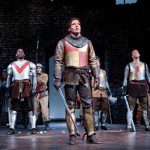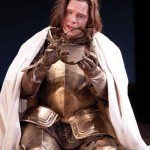The Kings and I
By • November 3, 2011 0 1804
The Shakespeare Theatre Company calls its productions of “Richard II” and “Henry V” now being performed at Sidney Harman Hall’s “The Leadership Repertory.”
I call it two of the most outstanding Shakespeare productions I’ve ever encountered, period.
David Muse directs “Henry V” with casts whose members appear in different parts in both plays. The strong reed that holds both together, in terms of acting, is Michael Hayden, who plays both Richard and Henry.
So what’s the final result?
If you should happen to see both plays — and you should, you should — you can see the issue of the humanity of leaders and kings in action. Kahn has the more difficult task at hand, in some ways: “Richard II” is earlier, nebulous Shakespeare, it’s the poet bard blossoming fully, the playwright not so skilled as to be able to flesh out an entire cast of characters.
Richard, by taking on and wronging the ambitious Henry Bolingbroke, a tough, pragmatic, steely man who has all the qualities of leadership except legitimacy, ends up sparking civil war and being deposed and in the end murdered. But the more he loses in power the more he gains in humanity, eliciting some of Shakespeare’s most famous and poetic speeches, of loss, mourning and final self-understanding. He cannot rule men’s hearts but he can break the heart of an audience.
Both plays have casts sturdied up and double-cast by STC veterans so that when you see in the opening scene Ted Van Griethuysen, Floyd King and Philip Goodwin as Richard’s uncles, you know you’re in good hands.
That confidences pushes over into “Henry V”, which is fully formed Shakespeare, at full throttle and voice. It’s a play overly familiar for its rousing call to battles, as Henry and his English horde invade France, but it’s also much richer than that in tone and character in a wholly imagined world.
And it’s done by the use of a three actors as an inviting chorus, by making the audience fellow travelers, co-conspirators, partners and witnesses. They prod us: “Imagine now, think ye that the stage is an ocean, a field, conjure up…” We become almost intimate presences ourselves, deep in the mud of Agincourt, silently standing by in the tavern where Falstaff lays dying, we are at the French court and the fields where weary, sick English soldiers get succor from a “little bit of Harry in the night.”
The glue in both productions is Hayden, who has an intensity, a humanity, and a gift for the language that makes him mesmerizing as he should be in both parts. Richard may be squander his power, but he is never anything less than a commanding presence. Henry, whether ferreting out traitors, bumbling with his bad French as he attempts to court the French princess, weeping over the body of an old companion he’s had to execute, or uniting his troops as “we few, we happy few, we band of brothers” at Agincourt is never anything less than a grand human being, a kingly king. In this, Hayden is the king of king players.
Both plays run some minutes over three hours. They seem in the mind, still not over. (Through April 10.)



